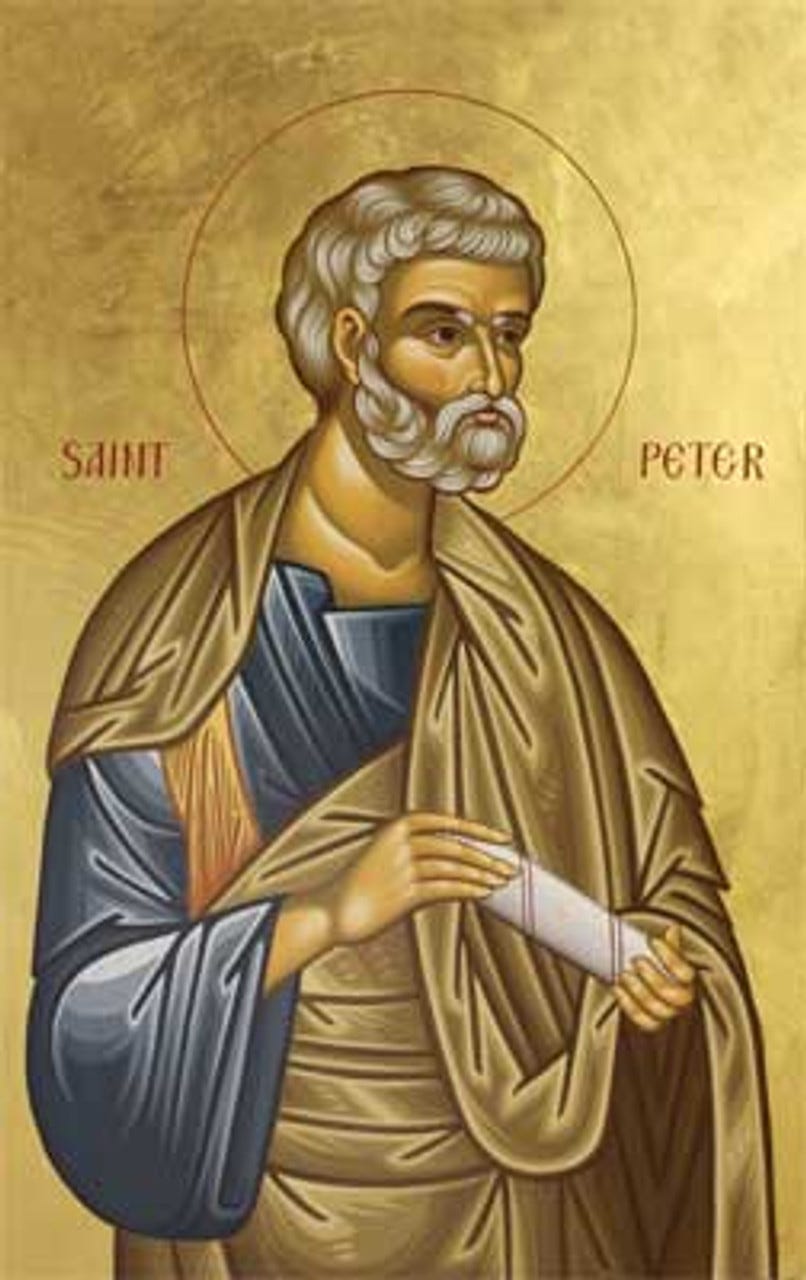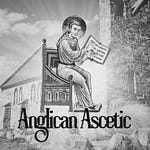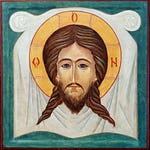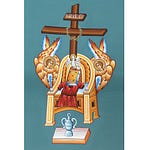[Note: the audio recording above will vary in places from the prepared text below.]
Saint Peter’s confession is what we hear today in the Gospel, and I will endeavor in my preaching to also discuss the Christian doctrine of justification by faith.
First to Peter’s confession and our Gospel passage. Jesus asks all the disciples, “Who do you say that I am?” And it is Peter who speaks up. Peter says, “You are the Christ, the Son of the living God.” These are words taken up in the ancient prayer of the Church called the Jesus Prayer: “Lord Jesus Christ, Son of the Living God, have mercy on me.” Yet it is worth asking, what kind of words are these, as said by Peter? Does he mean them sincerely? Are these words just words, that he happened to come upon? Is Peter repeating words he heard someone else say, some other disciple? Does Peter really believe them? What is going on here?
Our Lord tells us what is going on here, in His response to Peter. Jesus says, “Blessed are you, Simon. For flesh and blood has not revealed this to you, but my Father Who is in heaven.” And so it is our Lord Who affirms for us that Peter’s words are glorious. They are glorious, meaning his words are not accidental, not pretending, not insincere or counterfeit. Peter is not trying to please the Teacher so as to be in the teacher’s good graces and be recognized as the best student. Peter really believes them, even if Peter himself does not know how he came to this view of Jesus.
What is going on is that Peter at this moment has received the power of the Holy Spirit, and received Him in such a way to perceive Christ in His divinity, as the Son of the Living God, that is, the Son of the Father. Peter’s words are so glorious, so full of grace, that Jesus in fact renames him, and gives him the name Peter, which in Greek is “Cephus,” a word that means rock. And Jesus goes on to say “On this rock I will build My Church.” Faith in Christ is what the Church is founded upon. And because we also know that the Holy Spirit establishes the Church, we therefore can consider that to speak about Faith, is another way of speaking about possessing the Holy Spirit in His power. And this makes the matter of Faith a very exciting one.
To have faith or to not have faith, is not a matter of saying or not saying certain words, nor is faith about feeling one way and not another. As Saint Paul teaches, “Faith comes from what is heard” (Rom 10:17). And Paul is referring to what we hear in the proclamation of the Gospel. And what we hear in the Gospel are the words of life–indeed, words that reveal life, the true life, which is Jesus Christ and life in Him. When we truly hear the Gospel proclaimed, the words become full of grace by the Holy Spirit working upon us and bearing Christ to us. This is why Paul teaches, “The letter kills, but the Spirit gives life” (2 Cor 3:6). And so, what we hear, when it is of God, is life made life by the Holy Spirit, and such life gives faith and builds faith, and this faith is faith entirely because of the Holy Spirit acting upon us.
This points to an important topic in Christian doctrine, but one often misunderstood: justification by faith. Again, Saint Paul teaches us on this. In Romans Paul writes, “We conclude that a man is justified by faith.” To be justified in the vocabulary of the New Testament is to be declared as righteous in the eyes of God. And to be righteous means to be able to be free from sin. The capacity to be free from sin (righteousness) we receive by faith. And faith, as we have seen, means possessing the power of the Holy Spirit. And so the capacity to be free from sin we receive as we possess the power of the Holy Spirit in our heart and in our mind.
By Faith–which justifies us, that is, makes us capable of being free from sin which is righteousness–we are truly able to live in wonder of God,
live in awe of God, live in trembling of God.
And this is what the Church is founded upon. By this the Church is established: Faith–the Holy Spirit active in human hearts and minds; Faith–which justifies us, which declares us in the eyes of God to be righteous, which declares us in the eyes of God to be given the capacity to be free from sin. The capacity to be free from sin means the capacity to become more and more like Christ; the capacity to conceive the holy Jesus in our heart; the capacity to bear Him in our mind, and the capacity by grace to grow up to the fullness of the stature of Christ, even to be perfect in Christ Jesus. This is why Saint Peter’s words are so glorious: they show the power of faith, and they show that to say we have faith, means the Holy Spirit is working His power upon us, in us, and through us.
Dear brothers and sisters, let us understand the importance of faith. Faith–because through it we are justified because we are given the capacity to be free from sin; faith means we are able to become Saints, which is the only true goal of Christian life. Faith means the power of the Holy Spirit is filling us, forming us, purging us of our sins, releasing us from our passions (our bad habits, our spiritual addictions), illuminating our heart and purifying our mind. Faith means we are able more and more to say with Saint Paul, “O the depth of the riches and wisdom and knowledge of God! How unsearchable are His judgments and how inscrutable His ways!” By Faith–which justifies us, that is, makes us capable of being free from sin which is righteousness–we are truly able to live in wonder of God, live in awe of God, live in trembling of God. And we are able to say with Peter and countless saintly Christians: “Lord Jesus Christ, Son of the Living God, have mercy upon me.” Able to give thanks to God with our whole heart, saying the Jesus Prayer of the Heart: “Lord Jesus Christ, Son of the Living God, have mercy upon me” knowing that Saint Peter from heaven smiles at each recitation of the Jesus Prayer, knowing that through Christ’s mercy, we are being transformed as he was: made able by grace to behold the Christ no longer dimly as through a dark glass, but face to face: transfigured, and unspeakably glorious. Amen.











Share this post